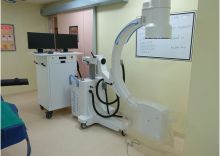Gynaecology is a branch of medicine that focuses on women’s health, specifically related to the female reproductive system.
It involves the examination, medical care, and surveillance of various conditions and diseases that affect women’s reproductive organs, including the uterus, ovaries, fallopian tubes, and breasts.
Gynaecologists are doctors who specialise in maintaining and promoting women’s reproductive health, addressing issues such as menstrual disorders, contraception, fertility, pregnancy care, menopause, gynecologic cancers, and other gynaecological conditions.
Given below is an overview of the major gynaecology services.
Routine gynaecological check-ups and screenings: These are crucial for monitoring and maintaining women’s reproductive health.
Examples include:
- Regular Pelvic Examinations
- Pap Smears
- Breast Examinations
Contraception counselling and family planning: Providing information and guidance on various contraceptive methods and helping women make informed decisions about family planning.
Pregnancy care: Prenatal care, monitoring fetal development, and managing common pregnancy-related issues like—
- Morning Sickness
- Gestational Diabetes
- High Blood Pressure
Management of menopause and hormonal changes: Support and treatment for women experiencing menopause symptoms, including—
- Hot Flashes
- Mood Swings
- Vaginal Dryness
Evaluation and treatment of infertility: Assessing and providing treatment options for couples struggling with infertility, including—
- Fertility Medications
- Assisted Reproductive Technologies
- Surgical Interventions
Gynecologic oncology: Diagnosis and treatment of gynecologic cancers.
Sexual and reproductive health counselling: Offering guidance on sexual health, addressing concerns related to—
- Sexual Dysfunction
- Sexually Transmitted Infections (STIs)








